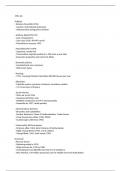1951-64:
Political:
. Winston Churchill(-1955):
- Inactive, international statesman
- Anthony Eden acting prime minister
. Anthony Eden(1955-57):
- Lack of experience
- Suez crisis 1956, 40 MP’s revolt
- Macmillan to treasury 1955
. Macmillan(1957-1964)
- Supermac, media flair
- Conservative majority pushed to a 100 seats a year later
- Economic prosperity and control of affairs
. Domestic policies:
- Accepted post war consensus
- NHS iconic status
. Housing:
- 1951 - Housing Minister Macmillan 300,000 houses per year
. Education:
- tripartite system, grammar, technical, secondary modern
- 11+ in last year of primary
. Social reforms:
- Clean air act of 1956
- Housing and factory acts
- Wolfden commission of 1957, homosexuality
- Homicide act 1957, death penalty
. Internal labour divisions:
- Bevanites and Gaitskellites
- Nuclear deterrent, Clause IV Nationalisation, Trade Unions
- Frank Cousins bus strike, 1958, TGWU
- Scarborough conference 1960
. Conservative fall from power:
- Profumo affair, 1963, John Profumo, Christine Keeler
- Night of Long Knives 1962, 1/3 of cabinet
- George Blake, 1961, John Vassal, 1962
Economic:
. Post war boom:
- Rationing ended in 1954
- Wage increase by 4.5% by 1960
- Unemployment at 200,000, less than 1% of workforce
- 1955 election, 134 million pound tax cuts for middle class from Raab Butler
,- Late 1950’s, import 29% percent more goods than 1951 for same number of exports
- Higher income per head than any other country except US
. Post war consensus:
- State and private economy
- Support for NHS
- Working with trade unions and employers
- Full employment
. Stop-go economics:
- Stop-go cycle
- Run on pound due to Suez
- Peter Thorneycroft believed in Monetarism, Macmillan kept expansionist policy due to risk of
increased unemployment against post-war consensus
- 1959, tax cuts of £370million and Sterling regaining value against dollar
- 1961, pay pause to hold down wage inflation and ask IMF for loan
- 1963, Beeching report and 30% cuts in rail network
Social:
. Affluence and consumerism:
- New Towns built Harlow and Kirkby after pre war slums cleared
- 1951-1961,£7 increase in men’s wages
- Home ownership increased and private savings increased
. Rising living standards:
. 1960, 50% watch TV in evening and 10 million TV sets
. Car ownership rose from 25% between 1957-1959
. Holiday Camps, Butlins 60,000 people each week in 1950’s
. Class and establishment:
- 1951 election, 65% of working class Labour and 80% Conservative
- Late 1950’s people less following establishment after CND , Profumo and Suez
- Satire boom in 1960, late 1950’s Angry Young men, class system not broken
. Position of women:
- Average marrying age 21, 75% of all women married, only 1/5 working
- 1964 number of working women increased however still depended on men
- Equal pay for teachers, 1952 and civil servants, 1954
. Attitude to immigration and racial violence:
- 1958 Notting Hill riots, Justice Salmon 140 majority white arrested
- Kelso Cochrane murder 1958, mixed protest of 1000
- Conservative Peter Griffith -1964, ‘if you want a … as a neighbour’
- 1962, Commonwealth immigrants act, received 70% support
- 1962, survey, 90% supported legislation to curb immigration
- 1963 - Southall Residents association
- Oswald Mosley 1959, trade union discrimination 1960’s
- Notting Hill carnival 1959
- 1958 n word hunts and p word bashing
- 1/5 objected to working with them, 1/2 would live next to them and 9/10 hated mixed marriages
, . Youth culture:
- 1959, 5 million teenagers, 10% of population
- Early 1950’s Teddy Boys, later Rockers and Mods
- 1964, Brighton 2 days clash and violence
Foreign affairs:
. EEC(1961-1963):
- Scuhman Plan, 1950, France and Germany, Britain do not join
- Treaty of Rome, 1957
- 1959 attempt at EFTA fails
- Britain’s EEC application submitted 1961,reversal of party policy, rejected 1963
. USA and USSR:
- Macmillan maintains relationship with JFK who updates on Cuban Missile crisis
- USA and Britain united against Communism
- Burgess and Maclean affair 1951, tests relationship
. Nuclear deterrent:
- Labour committed, USA stops sharing secrets
- Britain H bomb tested in 1957, concerned CND forms in 1958
- 1958 Aldermaston march
- USA shares nuclear secrets under Mutual Defence Agreement 1958
. Korean War(1950-1953):
- North(backed by China and USSR) vs South(backed by rest)
- NATO ask for troops, Britain sends 2nd most(90,000)
- Cold War mini battles and Britain still willing to join in
. Suez(1956):
- 80% of Western Europe old imports pass through canal
- USA and Britain pull out of Aswan Dam 1956
- Caused protest form USA, media, Labour Party
. Winds of change and decolonisation:
- 1951 Britains retreat already began, 1947 Indian independence
- Mau Mau rebellion 1952, and violent uprising by Jomo Kenyatta
- Hola prison camp atrocity
- 1960, Winds of Change speech by Macmillan
- 1957, Ghana independence, 1963 Kenya independence, 1964 achievement
1964-70:
Political:
. Wilson:
- Challenged Gaitskell’s cabinet in 1961, although had some right wing ideas
- Relied on kitchen cabinet and anxious privately but relaxed and skilful on TV
- Main concern was modernisation and party unity
. Labour divisions:
- Wilson united party under White Heat modernisation policy
- Suspicious of Brown, Callaghan and Jenkins, to much attention to party




